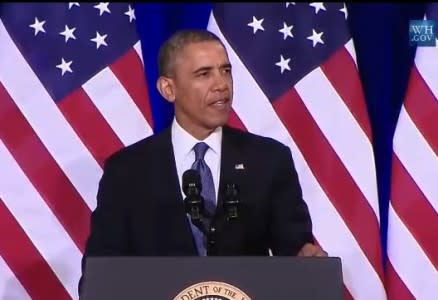Obama’s NSA reforms far-reaching but hinge on Congress
President Barack Obama called for basic reforms to National Security Agency spying programs on Americans, but he also asked for help from his own administration and a divided Congress on a key reform.
Obama asked for an end to direct government access to Americans’ phone data, recommending that Attorney General Eric Holder and intelligence officials to come up with a plan for moving the massive data collection out of government hands by March 28.
“Today, I can announce a series of concrete and substantial reforms that my Administration intends to adopt administratively or will seek to codify with Congress,” he said.
Congressional officials have already said some of the moves would need House and Senate approval anyway, after they are recommended or made by the President.
Critics of the NSA say its surveillance programs violate the Constitution’s Fourth Amendment, which protects people against unreasonable searches and seizures. Supporters say the agency is acting legally under powers granted to it by Congress and policies monitor by the secret Foreign Intelligence Surveillance Court (or FISC) court.
The most controversial of the programs has been the phone-data collection program, which would change significantly if the President and Congress can agree on a new plan.
“I am therefore ordering a transition that will end the Section 215 bulk metadata program as it currently exists, and establish a mechanism that preserves the capabilities we need without the government holding this bulk meta-data,” Obama said.
“I’ve ordered that the transition away from the existing program will proceed in two steps. Effective immediately, we will only pursue phone calls that are two steps removed from a number associated with a terrorist organization instead of three. And I have directed the Attorney General to work with the Foreign Intelligence Surveillance Court so that during this transition period, the database can be queried only after a judicial finding, or in a true emergency,” he said.
“Next, I have instructed the intelligence community and Attorney General to use this transition period to develop options for a new approach that can match the capabilities and fill the gaps that the Section 215 program was designed to address without the government holding this meta-data. They will report back to me with options for alternative approaches before the program comes up for reauthorization on March 28. During this period, I will consult with the relevant committees in Congress to seek their views, and then seek congressional authorization for the new program as needed.”
At the start of the speech, the President gave a history lesson about the American intelligence community and safeguards put in place to shield citizens from surveillance without cause.
That changed, said Obama, after the 9/11 terrorist attacks, saying it is “hard to understand the transformation” that has occurred within the intelligence community to meet the need to combat “real and novel” threats.
“The danger of government overreach remains acute,” he said , about the broad technology tools used by the NSA, adding that the agency consistently followed protocols to protect the privacy of the American people.
In the months leading up to Obama’s speech, Congress has been divided on ideological lines more than party lines on changing the once-secretive programs, many of which were publicly leaked by former NSA analyst Edward Snowden.
Obama also called for the appointment of a special panel of advocates to argue cases in front of the FISC court. Critics of the court claim that it is not an adversarial court, and just a “rubber stamp” venue for the NSA.
“To ensure that the Court hears a broader range of privacy perspectives, I am calling on Congress to authorize the establishment of a panel of advocates from outside government to provide an independent voice in significant cases before the Foreign Intelligence Surveillance Court,” he said.
Supporters of FISC, including Judge John D. Bates (who heads the Administrative Office of the U.S. Court System) strongly object to this idea. Bates has called the proposed advocate “counter-productive.
Obama also doesn’t want to change the current process of issuing National Security Letters. These documents allow the FBI to collect financial records with court approval. But he wants information about the letters released at some point.
“I have therefore directed the Attorney General to amend how we use National Security Letters so this secrecy will not be indefinite, and will terminate within a fixed time unless the government demonstrates a real need for further secrecy. We will also enable communications providers to make public more information than ever before about the orders they have received to provide data to the government,” he said.
President Obama rejected a recommendation from his own five-person expert panel that would require a court order for such letters.
Recent Constitution Daily Stories
How Dr. Martin Luther King, Jr.’s birthday became a holiday
New bugdet gives some relief to federal court system


